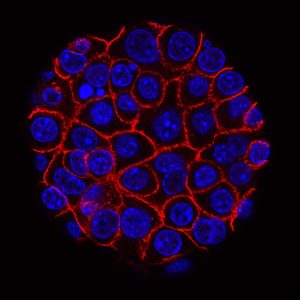
Amgen and AstraZeneca’s experimental drug cuts asthma exacerbations by up to 71%
pharmafile | September 7, 2017 | News story | Research and Development | Amgen, AstraZeneca, MedImmune, asthma, pharma, pharmaceutical, tezepelumab
An anti-TSLP monoclonal antibody jointly developed by Amgen and AstraZeneca’s global biologics and research division, MedImmune, has met its primary endpoint in Phase 2b trials, demonstrating a significant reduction in annual exacerbation rates in patients with severe, uncontrolled asthma whose condition had not been improved by taking inhaled corticosteroids or long-lasting beta-agonists, with or without oral corticosteroids and additional asthma controllers.
To this end, tezepelumab reduced asthma exacerbation rates by 61%, 71% and 66% compared to placebo in those taking 70mg or 210mg every four weeks or 280mg every two weeks, respectively. These reductions were observed independent of baseline blood eosinophil count or other type 2 (T2) inflammatory biomarkers. Lung function was also improved in all dosage groups, while the two higher dose groups also saw improvements to asthma control.
Tezepelumab works by inhibiting TSLP, an epithelial cytokine produced in response to pro-inflammatory stimuli such as allergens. Bahija Jallal, Executive Vice President and Head of MedImmune, explained: “In asthma patients, TSLP functions as an upstream epithelial ‘master-switch’ right at the start of the inflammation cascade. By binding to TSLP, tezepelumab impacts multiple downstream inflammatory pathways associated with asthma, as shown by striking reductions in the level of multiple biomarkers in the trial, including blood eosinophils, IgE and FeNO. This broad biomarker response is unprecedented among respiratory biologics and reflects our commitment to leading respiratory science for unmet medical needs.”
Dr Jonathan Corren at the David Geffen School of Medicine, UCLA and Principal Investigator of the trial, also added: “These efficacy results strongly confirm that TSLP is an important mediator of inflammation in severe asthma. Due to its activity early in the inflammatory cascade, tezepelumab may be suitable for patients with both T2 and non-T2 driven asthma, including those ineligible for current biologic therapies which only target the T2 pathway.”
Matt Fellows
Related Content

AstraZeneca shares results for Imfinzi in phase 3 trial for small cell lung cancer
AstraZeneca has announced positive high-level results from the phase 3 ADRIATIC trial, which demonstrated that …

FDA accepts BLA for AstraZeneca and Daiichi Sankyo’s datopotamab deruxtecan for breast cancer treatment
AstraZeneca and Daiichi Sankyo have announced that their Biologics License Application (BLA) for datopotamab deruxtecan …

FDA approves AstraZeneca’s Ultomiris for NMOSD treatment
AstraZeneca has announced that the US Food and Drug Administration (FDA) has approved Ultomiris (ravulizumab-cwvs) …








